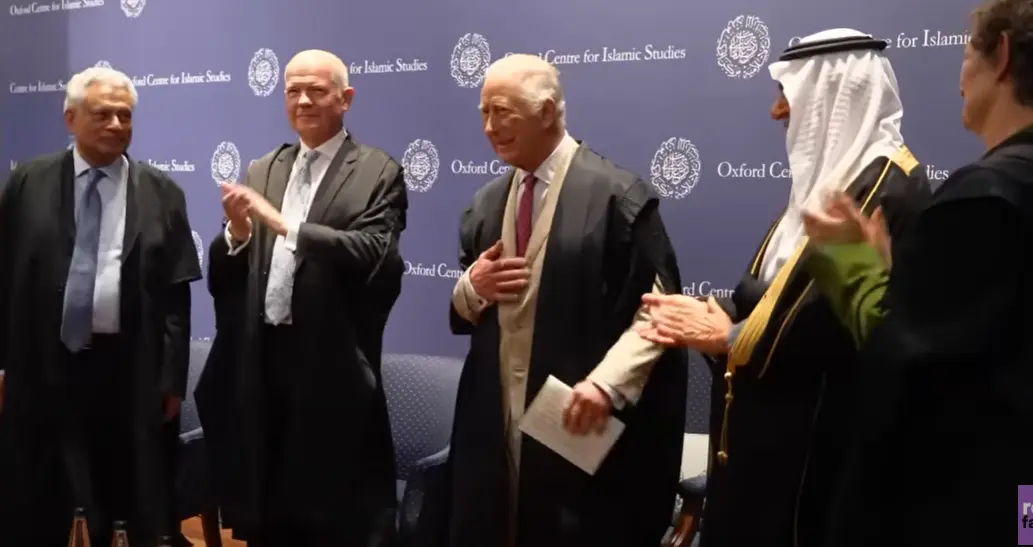
Divided Kingdom? King Charles Slammed for Islamic Centre Speech
A Royal Visit with a Message of Unity
King Charles III Interfaith Message Sparks Debate – On July 17, 2025, King Charles III visited the Oxford Centre for Islamic Studies to celebrate its 40th anniversary. As the Centre’s patron since 1993, the King inaugurated a new wing named in his honour, the King Charles III Wing and launched the King Charles III Programme, which promotes education, leadership, and global dialogue.
During his speech, King Charles emphasized the importance of interfaith understanding and respect for Muslim contributions to British society. He greeted the audience in Arabic, a gesture meant to symbolize harmony and mutual respect. The event was attended by scholars, students, and dignitaries, including Lord Hague and Oxford University’s Vice Chancellor.
The Centre itself has long served as a bridge between Western and Islamic scholarship, and the King’s visit was seen by many as a reaffirmation of his lifelong commitment to cultural dialogue and religious tolerance.
Online Backlash: Praise and Criticism Collide
While the event was celebrated by many, it sparked a wave of criticism online in September 2025. Social media platforms saw a surge of angry posts, with some users labeling King Charles a “traitor” and accusing him of promoting values that conflict with traditional British identity.
The backlash came amid ongoing debates in the UK about immigration, cultural integration, and national identity. Critics argued that the King’s gesture was politically charged and out of touch with public sentiment. Some claimed that his support for Islamic studies was a form of favoritism, while others questioned the timing of the event given rising tensions in Europe.
However, defenders of the King praised his courage and consistency. They pointed out that Charles has long supported interfaith efforts and that his actions reflect a broader vision of inclusive leadership. Many applauded his use of Arabic as a respectful gesture and emphasized the importance of building bridges in a divided world.
King Charles III’s Longstanding Interfaith Legacy
King Charles’s interest in Islamic culture and interfaith dialogue is not new. In fact, he delivered the Centre’s inaugural lecture titled “Islam and the West” back in 1993, setting the tone for decades of engagement. As Prince of Wales, he also inaugurated the Centre’s permanent home and supported its mission to foster understanding between cultures.
The newly launched King Charles III Programme includes initiatives like the Young Muslim Leadership Programme, environmental conferences and academic fellowships. These efforts aim to address global challenges while promoting mutual respect and collaboration.
His Majesty’s support for the Centre has helped it grow into a globally respected institution. Scholars from around the world have praised the King’s vision for using education as a tool to bridge cultural divides.
What This Means for Britain’s Future
The controversy surrounding King Charles’s visit highlights the complex role of monarchy in modern Britain. As a symbolic leader, the King is expected to represent unity and tradition but also to evolve with changing times. His interfaith advocacy reflects a desire to promote peace and understanding, but it also exposes deep divisions within society.
The UK continues to grapple with questions about identity, immigration, and multiculturalism. In this context, the King’s actions are both powerful and polarizing. Whether seen as a bold stand for tolerance or a misstep in a sensitive climate, his visit has sparked important conversations.
As Britain moves forward, the challenge will be to balance tradition with inclusion, and to ensure that efforts to promote harmony do not deepen existing divides. King Charles III’s legacy may well be shaped by how he navigates these tensions and whether his message of unity can truly resonate across the nation.
Conclusion: King Charles III’s visit to the Oxford Centre for Islamic Studies was meant to celebrate unity, but it has stirred strong reactions across the UK. As debates over culture and identity continue, his interfaith message stands as both a symbol of hope and a test of leadership in a changing world.
Also read – Bangladesh Army Chief’s Janmashtami Support Signals New Era of Inclusion
Stay informed with the latest news and updates – only on Rapido Updates.